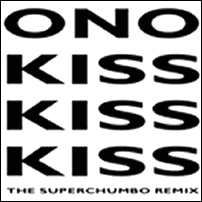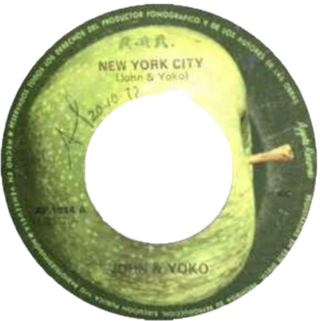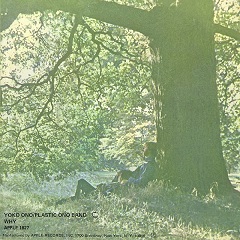Related Research Articles

Mind Games is the fourth solo studio album by English musician John Lennon. It was recorded at Record Plant Studios in New York in summer 1973. The album was released in the US on 29 October 1973 and in the UK on 16 November 1973. It was Lennon's first self-produced recording without help from Phil Spector. Like his previous album, the politically topical and somewhat abrasive Some Time in New York City, Mind Games received mixed reviews upon release. It reached number 13 in the UK and number 9 in the US, where it was certified gold.

"Kiss Kiss Kiss" is a song by Japanese singer Yoko Ono. It was originally released on Double Fantasy, her joint album with John Lennon, as well as on the B-side of his "(Just Like) Starting Over" single. The disco and new wave-influenced song features Ono gasping heavily and appearing to reach orgasm.
"Surprise, Surprise " is a song written by John Lennon that was first released on his 1974 album Walls and Bridges. Elton John contributes harmony vocals to the song.
"Hold On" is a song from the album John Lennon/Plastic Ono Band by John Lennon. It features only vocals, tremolo guitar, drums, and bass guitar, typical of the sparse arrangements Lennon favoured at the time. On the 2000 reissue of John Lennon/Plastic Ono Band, "Hold On" features a slightly longer introduction. The original version was restored on the 2010 reissue.
"Well Well Well" is a song by English musician John Lennon from his 1970 album John Lennon/Plastic Ono Band. The eighth and longest track on the album, "Well Well Well" features an aggressive guitar sound, screaming vocals and a pounding backing track.
"I Know (I Know)" is a song written by John Lennon released on his 1973 album Mind Games. The song is included on the 1998 box set John Lennon Anthology and the 2020 compilation album Gimme Some Truth. The Ultimate Mixes.

"Sisters, O Sisters", also known as "Sisters O Sisters", is a song written by Yoko Ono that first appeared on John Lennon's and Yoko Ono's 1972 Plastic Ono Band album Some Time in New York City, backed by Elephant's Memory. It was also released as the b-side to the couple's "Woman Is the Nigger of the World" single. It has been covered by a number of artists, including Le Tigre and Tater Totz.
"The Luck of the Irish" is a song written by John Lennon and Yoko Ono that was first released on the couple's 1972 Plastic Ono Band album with Elephant's Memory, Some Time in New York City. It was written in late 1971 and was performed by Lennon and Ono live at several protest rallies and television appearances before being released on the album. It had been slated to be the first single from Some Time in New York City backed by "Attica State" but the release was shelved in favor of "Woman Is the Nigger of the World". A live acoustic performance was released on several John Lennon compilation albums.
"Born in a Prison" is a song written by Yoko Ono and first released on her 1972 album with John Lennon Some Time in New York City as part of their Plastic Ono Band project.

"New York City" is a song written by John Lennon that was first released on Lennon's and Yoko Ono's 1972 Plastic Ono Band album Some Time in New York City.

"What You Got" is a song written by John Lennon that was first released on his 1974 album Walls and Bridges. It was later released as the B-side to his top 10 #9 Dream single.
"Bless You" is a song written by John Lennon that was first released on his 1974 album Walls and Bridges. It is a ballad expressing his love for his wife Yoko Ono, from whom he was separated at the time. Alternative versions appeared on the compilation albums Menlove Ave. and John Lennon Anthology.
"Scared" is a song written by John Lennon that was first released on his 1974 album Walls and Bridges. Alternate versions were subsequently released on the compilation albums Menlove Ave. and John Lennon Anthology.

"Why" is a song written by Yoko Ono that was first released on her 1970 Yoko Ono/Plastic Ono Band album. In the U.S. it was also released as the B-side of John Lennon's "Mother" single, taken from his John Lennon/Plastic Ono Band album.

"Touch Me" is a song written by Yoko Ono that was first released on her 1970 album Yoko Ono/Plastic Ono Band. An edited version was later released in the U.S. as the b-side to John Lennon's single "Power to the People."

"Remember Love" is a song written by Yoko Ono and initially released as the B-side of John Lennon's and Ono's 1969 single "Give Peace a Chance."

"Who Has Seen the Wind?" is a song written by Yoko Ono that first appeared as the B-side of John Lennon's single "Instant Karma!" It was later issued as a bonus track on a compact disc version of the Wedding Album.

"Listen, the Snow Is Falling" is a song written by Yoko Ono and recorded by Ono and the Plastic Ono Band that was first released as the B-side of John Lennon's 1971 single "Happy Xmas ." A version of the song was later released on a reissue of Lennon and Ono's Wedding Album and was covered by Galaxie 500.

"Move Over Ms. L" is a song written by John Lennon. It was originally intended to be released on his 1974 album Walls and Bridges but was left off shortly before the album release, and was eventually released as the b-side to Lennon's "Stand by Me" single. In the interim it was released by Keith Moon on his album Two Sides of the Moon. Moon also released it as the B-side of his "Solid Gold" single.
"Sunday Bloody Sunday" is a song written by John Lennon and Yoko Ono that was first released on their 1972 Plastic Ono Band album with Elephant's Memory, Some Time in New York City. The song addresses the Bloody Sunday massacre of 1972 and is one of two on the album that addresses the contemporary Northern Ireland conflict, "The Luck of the Irish" being the other.
References
- 1 2 3 4 Rogan, Johnny (1997). The Complete Guide to the Music of John Lennon. Omnibus Press. pp. 70–71. ISBN 0711955999.
- 1 2 3 4 5 6 7 8 9 Urish, B. & Bielen, K. (2007). The Words and Music of John Lennon. Praeger. p. 42. ISBN 978-0-275-99180-7.
- 1 2 3 4 5 6 7 8 "We're All Water". The Beatles Bible. 3 August 2010. Retrieved 2017-11-24.
- 1 2 3 4 5 6 Blaney, J. (2007). Lennon and McCartney: together alone : a critical discography of their solo work. Jawbone Press. pp. 65, 69–70. ISBN 9781906002022.
- 1 2 Marsh, Dave (1985). Fortunate Son: The Best of Dave Marsh . Random House. pp. 221–224. ISBN 0394721195.
- ↑ Cott, Jonathan (2013). Days That I'll Remember: Spending Time with John Lennon and Yoko Ono . Knopf Doubleday. p. 165. ISBN 9780307951281.
- ↑ Spizer, Bruce (2005). The Beatles Solo on Apple Records. 498 Productions. p. 69. ISBN 0966264959.
- 1 2 3 4 5 Madinger, C. & Easter, M. (2000). Eight Arms to Hold You. 44.1 Productions. pp. 74–83. ISBN 0-615-11724-4.
- ↑ Badgley, Aaron. "New York Rock (Original Cast)". Allmusic . Retrieved 2017-11-22.
- ↑ Holden, Stephen (March 31, 1994). "Review/Theater; Another Chorus in the Ballad of John and Yoko". New York Times . Retrieved 2017-11-20.